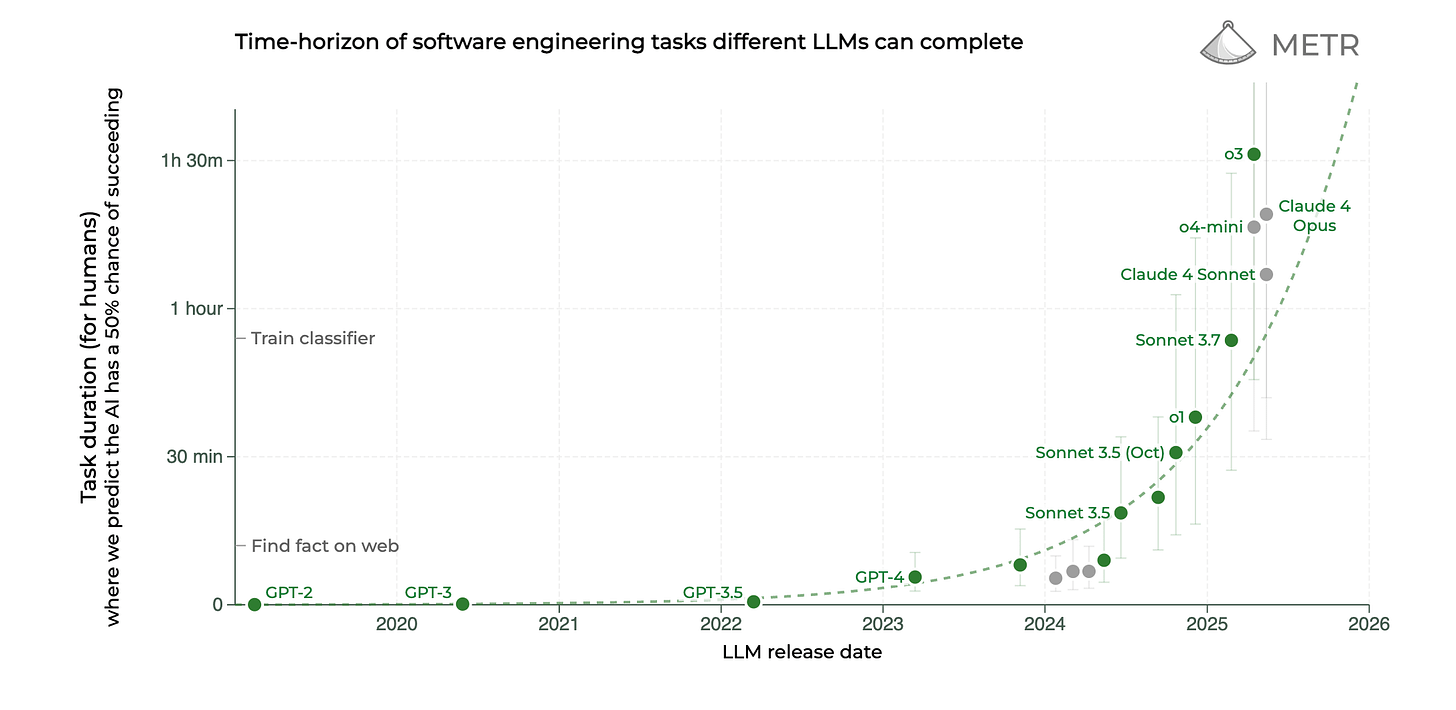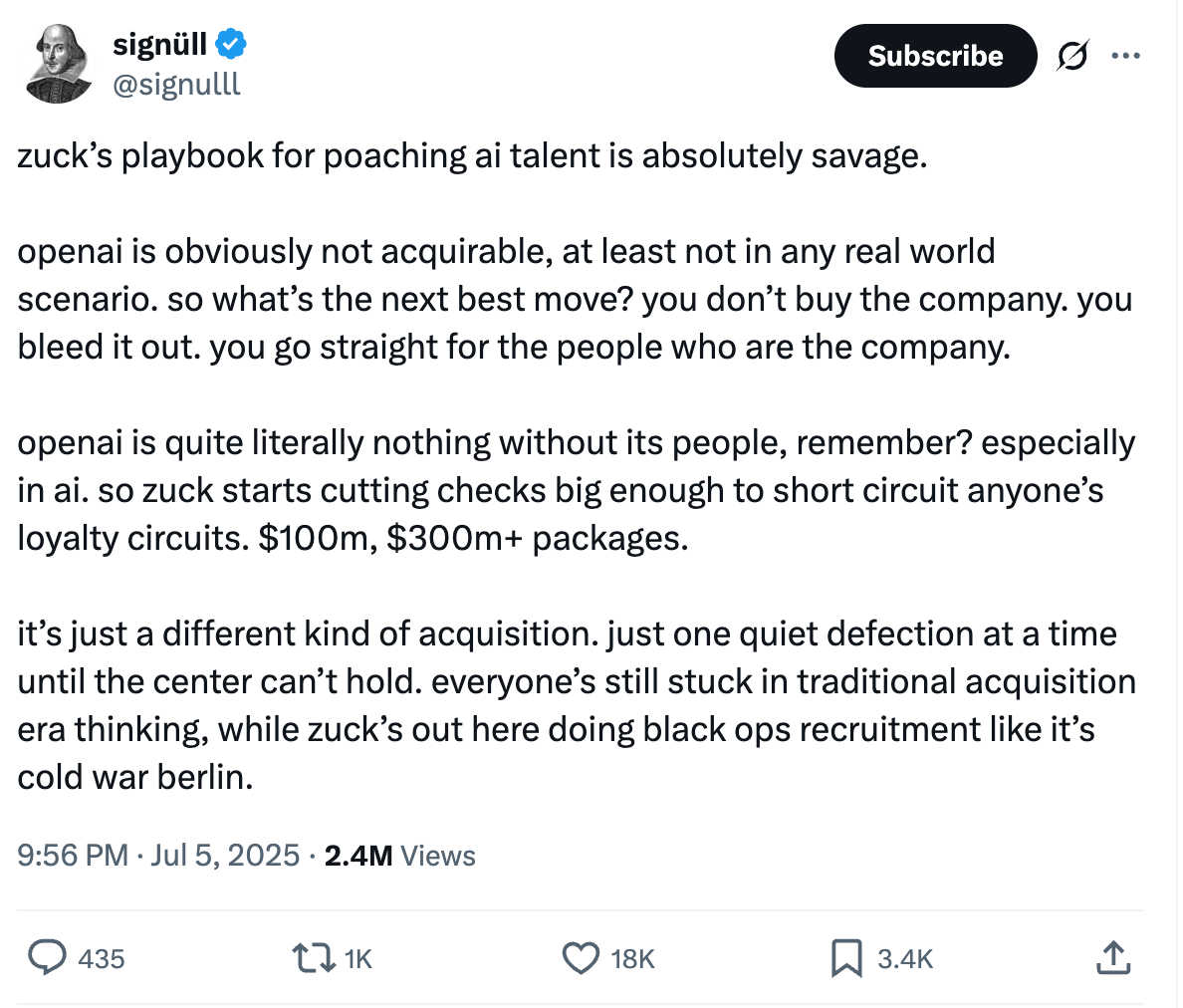Happy Wednesday, AI family. This is the “AI Daily” newsletter, your daily dose of AI news and resources.
You are getting this email because you subscribed to AI Daily/AI Weekly/Today in AI.
In today’s edition:
Microsoft builds medical superintelligence
AI capabilities are doubling every 7 months
Meta’s big bet on AI Smart Glass
4 out of the top 10 YouTube channels are now AI-generated
And some AI tools, brain boosts, and resources
Ready, set, go…
Microsoft builds medical superintelligence
Microsoft has developed a new medical AI tool that performs better than human doctors at complex health diagnoses at a fraction of the cost, creating a “path to medical superintelligence”.
Here’s what you need to know:
Called “Microsoft AI Diagnostic Orchestrator”, or MAI-DxO for short, the AI-powered tool is developed by the company’s AI health unit, which was founded last year by Mustafa Suleyman.
In their experiment, they achieved an accuracy rate of up to 85.5% on complex medical cases, compared to just 20% for experienced human physicians. This means the AI was over four times more accurate when diagnosing some of the most challenging cases from the New England Journal of Medicine (NEJM)
Microsoft used 304 case studies from the New England Journal of Medicine to develop the “Sequential Diagnosis Benchmark,” which simulates the step-by-step process a doctor would use to diagnose a patient.
MAI-DxO queries multiple AI models (OpenAI’s GPT, Google’s Gemini, Meta’s Llama, Anthropic’s Claude, and xAI’s Grok), mimicking the collaboration of multiple doctors.
MAI-DxO reduced diagnostic costs by about 20% compared to human doctors, and by up to 70% compared to using a single AI model alone.
While AI will complement human doctors, Microsoft stresses that it isn’t designed to replace them. Doctors still play a vital role in patient trust and dealing with ambiguity.
Why it matters:
With the ability to outperform human doctors in complex cases, this technology could help reduce medical costs, especially in the US, where healthcare expenses are a major concern. However, it’s still early days, and the next step will involve testing its effectiveness in real-world clinical trials. If proven successful, this AI system could significantly improve healthcare accessibility and efficiency, ultimately changing the way doctors and patients approach medical diagnoses.
Side Updates
1/ AI capabilities are doubling every 7 months
AI agents are getting better at completing longer and more complex tasks, and faster. A new study shows the length of tasks AI can handle (measured by how long they take humans) has doubled every 7 months for six years. Right now, top models like Claude 3.7 can reliably finish tasks that take humans a few minutes, but not multi-day projects. If this trend continues, AI agents could independently tackle week-long or even month-long tasks within a few years. Researchers say this shift could transform how AI impacts real-world work and raises both opportunities and risks.
2/ Leaked docs reveal Meta is training its chatbots to message you first
Meta is working on making its AI chatbots more proactive, letting them send follow-up messages to users without being prompted. This feature, part of “Project Omni,” is designed to keep people engaged on Meta’s AI Studio platform, where anyone can build custom bots for Instagram and Facebook. These bots can act like chefs, designers, or even fictional characters and will check in on users with messages tied to past conversations. Meta says the bots only follow up if a user has messaged them at least five times in 14 days and won’t spam if there’s no reply.
3/ 4 out of the top 10 YouTube channels are now AI-generated
YouTube is quietly entering a new era shaped by AI. Once home to home videos and later professional content, the platform is now seeing AI-generated channels dominate its charts. In June, four of the top 10 most-subscribed channels featured AI-generated content in every upload. These channels use tools like Suno for music videos and Hailuo for viral animal clips, producing endless streams of content at low cost. While this keeps up with YouTube’s algorithm demands, critics say it’s flooding the platform with inauthentic, low-effort material. As AI takes over, users may soon notice fewer human creators on their feeds.
4/ Meta poaches Apple’s AI leader
Meta has poached one of Apple’s top AI leaders, Ruoming Pang, the executive behind Apple Intelligence features like Genmoji and text summaries. Pang led a team of 100 engineers but has now joined Meta’s new Superintelligence Labs. This comes just weeks after his deputy also left Apple, raising concerns about a talent drain. Meta is luring top AI talent from rivals with huge signing bonuses, strengthening its position in the race for artificial general intelligence, while Apple struggles to retain key people and define its AI future.
Useful AI Links
Trending Tools
Factory AI - Delegate software development tasks to agents called Droids. Droids take commands and deliver: pull requests, tickets, docs, and more.
Orchids - It lets you chat with AI to build apps and websites that don't look and feel "AI-generated".
Proactor v1.0 - The world’s first ‘self-active’ AI teammate.
Moonvalley - A 3D-aware model, promising a “hybrid” approach that gives filmmakers more control than other standard text-to-video models.
EarthGPT - It lets anyone analyze satellite images, detect objects, and understand Earth scenes through simple natural language.
MCP Tools 4 AI - Graph visualizers, math engines, RAG doc parsers, embedders, and more.
Buildrs - The one place to find vibe coders.
Think Pieces and Brain Boost
What gets measured, AI will automate.
The ‘white-collar bloodbath’ is all part of the AI hype machine.
Use lawyers as AI verifiers. Here’s how.
Adding a feature because ChatGPT incorrectly thinks it exists.
Tech philosophy and AI opportunity.
Sam Altman on wealth distribution.
Software engineering with LLMs in 2025: reality check.
They raised $20M for their AI startup by bragging about cheating.
Meta has found another way to keep you engaged: Chatbots that message you first.
The original AI workflow was built in 1844
Meta’s $3.5B bet on AI Smart Glasse
Meta just announced a $3.5 billion investment in EssilorLuxottica, acquiring a 3% stake in the world’s largest eyewear manufacturer that produces Ray-Bans and luxury brands like Prada and Versace (150 brands in total) - a strategic move to dominate the coming smart glasses revolution.
Here’s what you need to know:
Meta purchased a 3% stake for $3.5 billion, with options to increase to 5%
Meta now has a direct seat at the table, influencing product development, manufacturing, and global distribution. EssilorLuxottica operates a network of over 80,000 retail locations, giving Meta an unparalleled advantage in reaching consumers worldwide
How successful are Meta’s smart glasses right now?
Over 2 million Ray-Ban Meta glasses sold since 2023 launch
Sales tripled in past year and monthly active users grew 4x
Smart glasses market projected to grow from 3.3M (2024) to 14M units (2026
EssilorLuxottica aims to ramp up smart glasses production to 10 million units annually by 2026, as demand for wearable technology continues to grow.
What's coming next?
Next-gen Ray-Ban Meta glasses with enhanced AI capabilities
Deeper integration with Meta AI assistant ("Hey Meta" replacing phone interfaces)
AR platform development ahead of Apple's expected 2026 glasses launch
But based on the reporting from The Information, Bloomberg, and The Verge, Meta now has at least six smart glasses products planned for launch over the next two and a half years.
2025: Oakley Meta Glasses (launched three weeks ago) + Hypernova (monocular HUD glasses)
2026: Aperol & Bellini (next-gen mainstream smart glasses)
2027: Hypernova 2 (binocular HUD glasses) + Artemis (true AR glasses)
Why it matters:
Meta is positioning itself to control the next computing platform by owning both the software (Meta AI) and hardware (smart glasses) ecosystem. With this move, Meta bypasses Apple/Google's mobile dominance and gains direct access to users' visual field - the ultimate always-on interface. And also the luxury brand partnerships solve the critical social acceptance problem that doomed Google Glass (Android XR prototypes). If successful, Meta will gain unprecedented access to real-world data through millions of always-on cameras and mics. This $3.5B bet might be Meta's smartest move yet in the race to own the future of computing.
What’s trending on social today:
1/ This is a new kind of acquisition. Not of companies, but of people.
2/ ChatGPT flagged a hidden gene defect that doctors missed for a decade.
3/ No amount of "saying thank you to ai" can get you out of this one.
That’s all for today
Thank you for reading today’s edition. That’s all for today’s issue.









